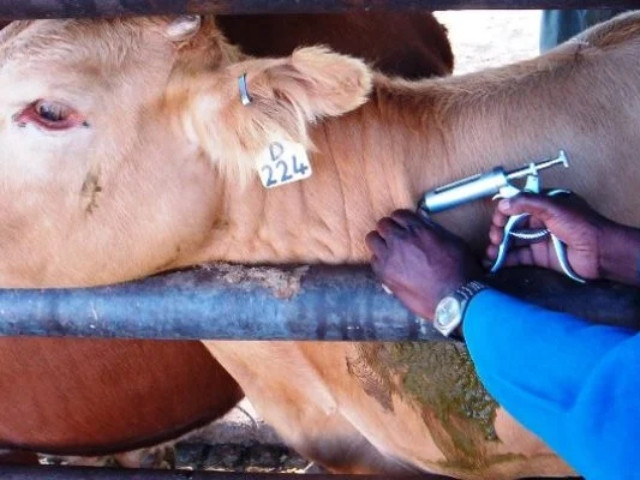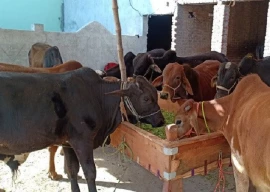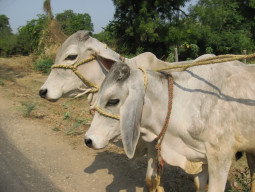
Livestock experts have stressed the need for launching comprehensive animal vaccination programmes ahead of Eidul Azha and establishing permanent structures in sacrificial markets rather than relying on makeshift arrangements, especially considering that over 90% of sacrificial animals come from Punjab and interior Sindh to Karachi.
In discussions with The Express Tribune, they highlighted the outbreak of the lumpy skin disease virus (LSDV) two years ago, which claimed the lives of hundreds of thousands of cows. They noted that LSDV still exists in Punjab, where 100% of animals have not yet been vaccinated against it. While some suspected cases were reported in Mehar and Dadu, and there were concerns raised in Gadap Town, there have been no symptoms of LSDV in Sindh so far.
Singh Agriculture University Department of Physiology and Biochemistry Chairman, Professor Dr Allah Bux Kachiwal, underscored the urgency of launching comprehensive vaccination programmes and conducting thorough animal checks as Eidul Azha approaches. He advocated for establishing permanent structures in sacrificial markets instead of relying on makeshift arrangements. These structures would safeguard both large and small animals from potential natural disasters such as torrential rains, urban flooding, and sweltering heatwaves.
Kachiwal stressed the critical need for proactive measures, highlighting the risks associated with disease outbreaks among dairy animals. He pointed out that the loss of such animals, which typically take around three years to mature, would be irreplaceable.
During the summer season, diseases affecting cows and buffaloes include foot-and-mouth disease, haemorrhagic diseases, septicaemia, black quarter, anthrax, lumpy disease, among others. Similarly, goats and sheep diseases include enterotoxaemia, caprine pleuropneumonia, anthrax, PPR (Peste des petits ruminants), and others.
Jamil Memon, a veteran farmer and Chairman of Sindh Dairy, Livestock, and Breeding Farms, highlighted the significance of religious sentiments driving people to purchase animals despite high prices. He noted that goat and sheep prices start from around Rs40,000 and Rs30,000, respectively, while cows range from Rs150,000 to Rs350,000, with market prices likely to increase further.
He noted that almost 80% of animals come from Punjab, while the remaining animals originate from the interior of Sindh and Balochistan, contributing to the sacrificial market of the port city. Expressing gratitude, he remarked, “Thanks to Almighty Allah, there is currently no fear of disease in Sindh, as the animals are healthy and fit.”
Director General of the Sindh Livestock Department, Dr Hizbullah Bhutto, reported that teams have been active since the Crimean-Congo haemorrhagic fever virus was reported in Balochistan two months ago. Vaccinations against potential diseases are ongoing throughout the province, with approximately 300,000 goats and sheep vaccinated in Tharparker, meeting the routine consumption needs of Karachi and Hyderabad. Another 250,000 vaccines will be administered soon in the area.
He mentioned plans to set up vaccination camps at bordering areas or entry points of Sindh, including Hub, Ghotki, Kashmore, Jacobabad, and others, as farmers and traders transport herds of animals to Sindh from Punjab and Balochistan. Teams will verify vaccination records, and animals found unvaccinated will be vaccinated immediately.
Additionally, Bhutto highlighted the extensive network of approximately 1,150 animal care hospitals, vet clinics, and dispensaries operated by the department. Trained veterinarians, paramedics, and staff are available six days a week, offering consultations and treatment for animals brought in by farmers.
Published in The Express Tribune, April 27th, 2024.
Like Business on Facebook, follow @TribuneBiz on Twitter to stay informed and join in the conversation.




1730797299-0/BeFunky-collage-(21)1730797299-0-165x106.webp)














1730706072-0/Copy-of-Untitled-(2)1730706072-0-270x192.webp)
COMMENTS
Comments are moderated and generally will be posted if they are on-topic and not abusive.
For more information, please see our Comments FAQ